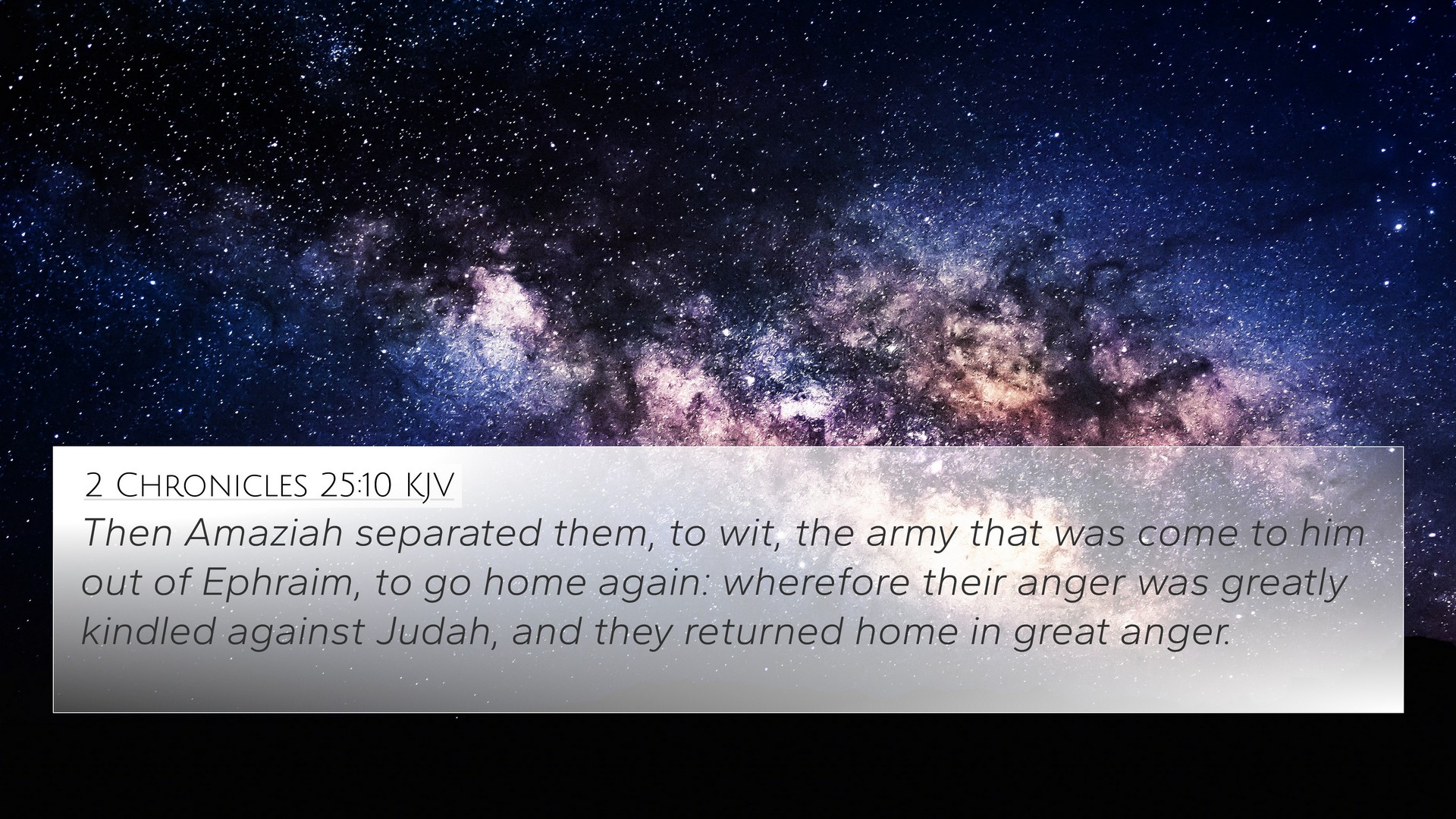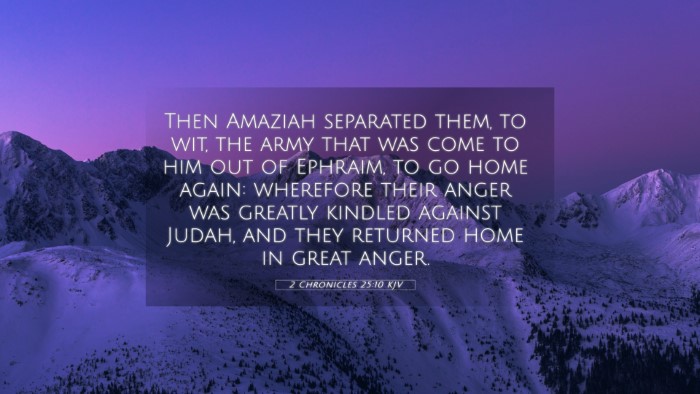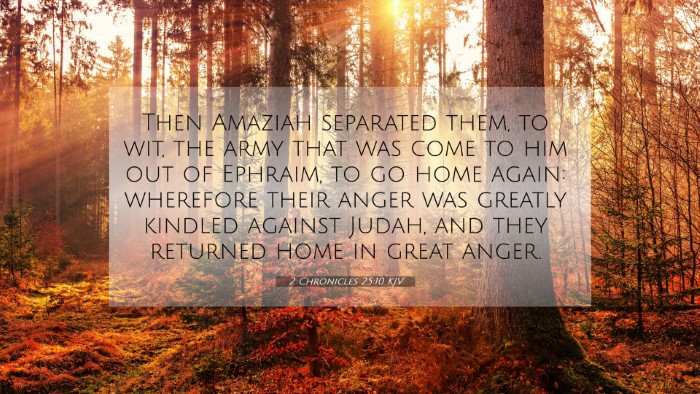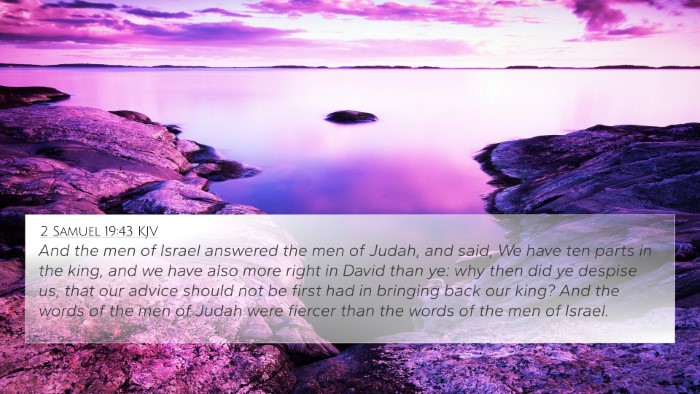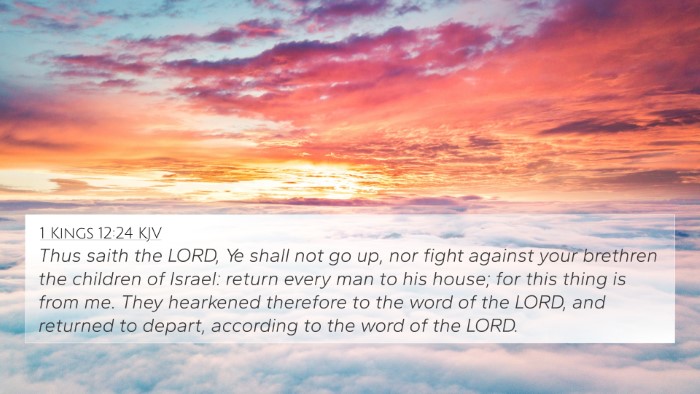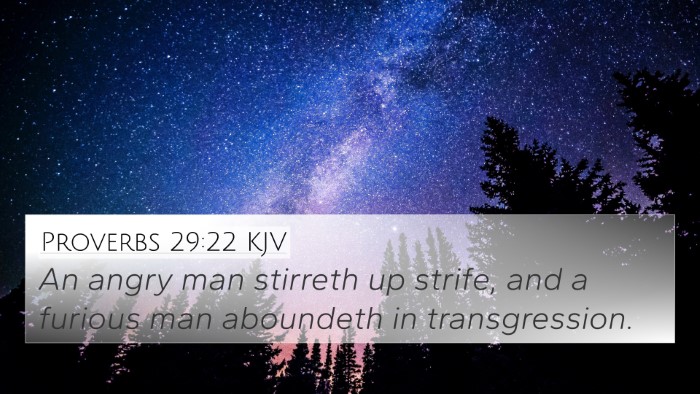Understanding 2 Chronicles 25:10
Verse Reference: 2 Chronicles 25:10 - "Then Amaziah separated them, to wit, the army that was come to him out of Ephraim, to go home again: wherefore their anger was greatly kindled against Judah, and they returned home in great anger."
Summary of Meaning
This verse presents a pivotal moment in the reign of Amaziah, King of Judah, where he made a crucial decision regarding the mercenary forces that had joined him. His choice to send these soldiers back home showcases themes of leadership, trust, and the consequences of one’s decisions.
Commentary Insights
- Matthew Henry's Commentary: Henry highlights that Amaziah felt a duty to separate from the forces of Ephraim, as he did not want to rely on potentially unfaithful allies, demonstrating the importance of integrity and divine guidance in leadership decisions.
- Albert Barnes' Notes: Barnes emphasizes that this separation angered the Ephraimites, who felt insulted and humiliated, pointing out the dangers of alienating powerful allies and the impact of pride in military relationships.
- Adam Clarke's Commentary: Clarke adds that Amaziah's decision to reject the mercenaries displayed both wisdom and a lack of foresight, as it left Judah vulnerable to attack. He reflects on the need for careful consideration of the people we ally with.
Contextual Significance
The broader context of this passage is that Amaziah had recently ascended to the throne and was establishing his rule. His interactions with neighboring kingdoms and their armies were crucial for the security of Judah. The decision to send the Ephraimite army back illustrates the tension between the kingdoms of Israel and Judah and the complexities of inter-kingdom relations.
Bible Verse Cross-References
Understanding 2 Chronicles 25:10 can be enhanced through several key Bible verse cross-references:
- 1 Kings 12:16: This verse outlines the historical tensions between Judah and Israel.
- 2 Chronicles 14:9-11: King Asa's reliance on God's strength rather than military alliances serves as a parallel to Amaziah's situation.
- 2 Chronicles 24:23-24: Another example of the dangers of misguided alliances and reliance on external forces rather than divine support.
- Isaiah 31:1: This verse warns against seeking help from Egypt instead of relying on God, highlighting the principle of faith in divine support rather than human strength.
- Jeremiah 2:36: This connects to the folly of forming alliances without divine direction, exemplifying the same principle displayed in Amaziah’s decision.
- Philippians 3:18-19: A New Testament passage reflecting on how one's decisions can lead to enmity and discontent among allies.
- Psalm 60:8: This psalm speaks of Edom as a reminder of the challenges surrounding alliances and the national identity of Judah.
Thematic Connections
The story of Amaziah in 2 Chronicles 25:10 can be linked thematically with various other Bible verses that reflect on leadership, divine guidance, and the impact of choices:
- Proverbs 3:5-6: Trust in the Lord with all your heart, emphasizing the importance of seeking divine guidance in decision-making.
- James 1:5: Encouragement to ask God for wisdom illustrates the importance of seeking divine insight before making significant decisions.
- Luke 14:31: Jesus discusses counting the cost, relevant to Amaziah's situation in calculating the strength of his alliances.
Practical Applications
Believers today can draw from this narrative various practical applications:
- Discernment in Relationships: Just as Amaziah needed to discern whom to ally with, individuals today must seek God's guidance in relationships.
- The Value of Integrity: Like Amaziah, there is a need for integrity in making decisions, particularly those affecting the community and spiritual relationships.
- Awareness of Consequences: Understanding that decisions made in leadership can incite reactions, one must consider the broader implications of their actions.
Conclusion
2 Chronicles 25:10 serves as a reminder of the complexities involved in leadership and the importance of reliance on God. By considering the detailed insights from public domain commentaries, as well as cross-references throughout Scripture, we grasp a fuller understanding of the text. The need for soul-searching, evaluating alliances, and returning to the foundational trust in God's guidance remains timeless among believers today.
